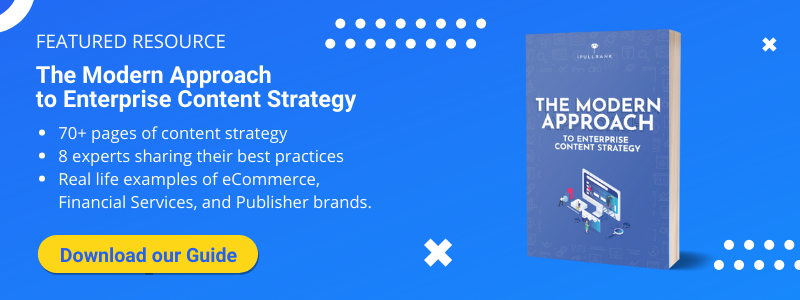Is in-house SEO a challenge for your organization?
Because it is for many companies; as an industry, search has matured to the point that there’s an abundant amount of apps, data, and training available.
So why is it difficult?
Today, we’ll look at the unique challenges that come with in-house SEO. We’ll look at what several well-known SEOs have to say on the topic.
What makes in-house SEO so challenging?
There is a long list of obstacles that businesses need to overcome when it comes to in-house SEO. If we’re going to have a chance at solving these problems ahead of time, we’ll need a clear and honest discussion about these issues and the consequences that come with them.
Let’s dive in.
The C-suite doesn’t want to invest in SEO
Pitching is an essential part of in-house search. If you want your budgets to be approved, you’ll need to make a compelling case stating why your plan will work.
So what’s the problem?
Most experienced professionals pitch value, and they use math to make their projections. This isn’t a bad thing on its own; it’s a problem because these projections are typically wrong, or they’re complicated if-then statements.
- If we can earn more rich snippets, we’ll be able to…
- If we generate X number of links, we should see an increase in…
- With the right content, we’ll be able to rank for…
- With a significant number of rankings, we’ll be able to generate…
At first glance, this makes sense.
None of us know enough about Google’s search algorithms to definitively state or promise a specific outcome or dollar amount; financial projections are all you’ve got. Your pitch is immediately off to a rocky start.
It gets worse.
Every other department in your organization is doing the same thing. They pitch management on their initiatives’ benefits and use projections to make it sound like their idea is a surefire bet.
Management sees through this.
Experienced managers have been burned by teams that promised a large windfall in their pitch but, in the end, failed to deliver results.
So they’re skeptical.
How are you supposed to get buy-in and motivate management to open their wallets?
You earn results before your pitch.
This is a ten-step process.
- Verify analytics and performance attribution are set up properly.
- Get data from your paid search teams (conversion keywords, search terms reports in Ads, top-performing pages, etc.)
- Make a list of your conversion keywords
- Create a separate campaign (which you’ll use as your working proof of concept)
- Create a compelling offer that attracts highly motivated searchers that drives conversions
- Collect data showing that your campaign is performing above and beyond Request a meeting with management.
- Make a list of your wants/needs
- Pitch your ideas using the results from your proof of concept campaign
- Emphasize that these results are from live, active campaigns and that these results can be amplified
- Share your list of wants and needs with management
Here’s why this strategy is so effective.
- It builds confidence because the data is based on real data, not projections
- Competing depts. that rely on projections are at a marked disadvantage
- If these depts. copy your strategy, both depts. win because performance data is based on actual results, not projections
- It forces your team to speak “dollars and cents”
- It enables you to turn specific people [managers, directors, executives into heroes] who chose the winning team/solution/strategy
Here’s the best part about this strategy.
You get privacy.
You can quietly test your proof of concept campaign so you’re able to identify what works. Fail privately so you can win big publicly.
The reputation of your team
Believe it or not, this factors heavily into the success or failure of your pitch. If your team has an excellent reputation in the organization, you have a certain degree of trust you can spend, as currency, to help your pitch succeed.
If your team’s internal reputation stinks, not so much.
What builds this kind of trust?
When it comes to results, there are two kinds.
You need both to win your pitch.
- Conventional results. Your team is a profit center that consistently delivers a positive return on investment, going above and beyond when needed. For search teams, this typically means the team consistently produces traffic, revenue, marketing qualified leads, etc.
- Transformative results. These results are game-changers; they’re the marketing grand slams that make incredible strides for the company. Your team knocks a large, established competitor out of the search results, or you consistently dominate the search results for the majority of your conversion keywords, etc.
Here’s why these results matter.
Conventional results build trust. It’s easy for management to take a risk on your proposal and spend more when they trust you. Transformative results, when they work, produce more trust and significant returns for your organization; they’re so powerful that these results can make or break careers.
Why does this matter?
Imagine C-level execs discussing your team with reverence (“yeah, that’s them, this is the team I was telling you about”). Now imagine these executives looking at you as a “cost center” (“ugh, let’s just blow them off and we’ll figure something out.”)
Is your reputation terrible?
Take the time to create conventional results. If you don’t have that kind of time and you need to make something happen now, make sure the results from your proof of concept campaign are strong. This will help you to navigate internal politics safely.
Technical or logistical limitations
What’s the difference between On-page SEO and Technical SEO?
You know the answer.
But that’s the problem. Many managers and executives don’t understand the differences between the two.
According to Bruce Clay, “Technical SEO is the practice of optimizing the “back end” of a site so that search engines like Google can better crawl and index the website.”
What about On-page SEO?
“On-page SEO is the practice of optimizing web pages from top to bottom. The dual purposes are to give pages a better chance of showing up in the search results and to create a better user experience for website visitors.”
Here’s why this matters.
Some managers assume that SEO and Technical SEO rely on the same skill sets. Others are aware of these issues but don’t have what they need to address the problem.
- Their team doesn’t have the training, technical prowess, or sophistication they need to get results
- Management forces you to prioritize on-page search (i.e., content marketing) and neglect technical search (e.g., page speed or competing CMS)
- There’s no clarity on roles, responsibilities, or permission. Your team doesn’t know who should be responsible for what, or they have two people claiming ownership over the same roles and responsibilities
- Search teams don’t have the systems, policies, and procedures needed to manage search in-house.
These issues are a serious roadblock to in-house SEO.
If your in-house SEO campaigns are going to perform well, these issues need to be addressed ahead of time, so your team knows what’s expected. The organization determines who has authority and control over what.
A lack of resources
This roadblock is self-explanatory.
Your team lacks an important resource that’s needed to set up, maintain, or improve your in-house SEO campaigns. If you’re an experienced SEO, you’ve probably had to find workarounds to address this issue. A lack of resources could be:
- A team that has the skills needed but lacks the workforce or internal resources to do the work
- A large team but incomplete instruction, systems, procedures, know-how, or training to properly run in-house campaigns
- Insufficient amounts of time to start and maintain an in-house SEO campaign
- A budget that’s insufficient to manage search in-house (you know what to do and how to do it, but you can’t afford to do it)
- A small team with little to no know-how and an insufficient budget
You see my point, though, right?
At some point in time, you’re going to experience a lack of resources in your SEO career. You’ll need to know how to address these issues ahead of time, and you’ll need to do it in a sustainable way over the long term.
This is a big ask.
This is why we’re going to get some advice from sophisticated SEOs who’ve already addressed these in-house issues.
Let’s take a look.
Melanie Mitchell @Chewy
Melanie is the Director of Acquisition Marketing and Head of SEO at Chewy.com and the author of the book In-House SEO: Taming the Challenges to Win in Search.
Getting your organization to believe in search
“First, ask yourself this question: How do you optimize your website for search when the organization and corporate culture are not aligned and believers in SEO? You cannot.
You simply cannot build and manage a successful in-house SEO program if your organization and its political constituents are not aligned behind the promise of search.”
Key takeaway:
If management and execs aren’t given a chance to weigh in, you won’t be able to earn their buy-in. This doesn’t mean that everyone has to agree. It simply means management needs the opportunity to share their grievances and objections.
A frank discussion about past failures, lessons learned, and a new plan of attack may be just the thing you need to win your next pitch.
Ignoring the elephants in the room means your pitch is more likely to fail.
Claudia Higgins @Conductor
Solutions Consultant at Conductor with 6 years SEO experience in-house / 2 years SaaS
Earning buy-in from the C-suite
Claudia knows that “SEO is a long game. Results often don’t come quickly enough to make an impact while people are still interested. There are also a lot of gray areas. It can be difficult to give straight answers to direct questions. And, unfortunately, straight answers are often the main language that execs speak.
Maybe you can’t answer an exec’s question with 100% certainty, but you need to be knowledgeable and brave enough to be able to say, “There’s no easy answer to that, but with all the information I have, my gut feeling is…” or even, “That’s a really great question, and I’m going to go and look at some things and get back to you.”
Be transparent, and set clear expectations.
If the results of a project aren’t going to be immediate, estimate when the impact might be observable and commit to sending updates.
Your main opportunity to win over senior management is likely to be via regular reporting on SEO performance.
Performance reporting is storytelling.
Take your data, distill it down to the main takeaways you want to deliver, and present it in a way that makes the story very clear.”
Key takeaway:
Even if it’s bad news, it’s good news to know. Your execs hear BS daily. They’re constantly fielding calls, emails, and requests for money. If you don’t have the data or proof, they need to say so. Be honest, open, and transparent even if you’re forced to deliver bad news. If you have to deliver bad news, present them with a face-saving option that shows you’re aware of the bottlenecks and you have a solution to come out ahead.
Winston Burton @Acronym
Winston is SVP of SEO at Acronym. He has over 15 years of organic and paid search experience.
Proving the Value of SEO
Proving the value of SEO depends on your client or prospective client’s goals and what will move the needle for them to get to page 1. This may either be local search, app store optimization, content marketing, technical optimization, etc.
That said, you must show performance improvements to secure more funding and make your client successful.
In my experience, some of the best ways to prove the value of SEO is to:
- Use an ROI model to show incremental improvements.
- Use paid search data to show the cost of acquiring the traffic through paid search.
- Back up your performance and results through reporting.
- Get a test budget.
- Show competitor wins through different SEO strategies and tactics.
Key takeaway:
Proving the value of SEO comes down to one question.
Does this make dollars and cents? This is the language managers and executives are trained to speak. The better you are at speaking their language, the easier it’ll be to earn their trust, a bigger budget, and the time you need to make great things happen.
Kevin Indig @ Shopify
Kevin is the Director of SEO @ Shopify, writes the Growth Memo, and records the Tech Bound podcast.
What to do when you have no Engineering Resources for SEO
“When you have no engineers to implement your recommendations, look outwards. What can you do outside of your website that has an impact on important (landing) pages? Most often, the solution is content marketing. The goals are to a) raise brand awareness to increase organic traffic, b) create “natural” backlinks, and c) make content assets that could be implemented on your site at some point in time in the future.
The best way to solve this issue is to get an exclusive developer just for SEO if that is an option.”
Key takeaway:
Technical SEO scales well. If you don’t have the engineering resources you need, focus your attention on developing 10x content. Produce quantitatively better content (e.g., more data, depth, design, or drama). Create content that’s too good to ignore, then incorporate technical SEO when you can.
Bill Widmer for Ahrefs
Bill is a freelance content marketer and SEO currently writing for Ahrefs.
Building a strong in-house SEO team
“Hiring a team is right for anyone who wants to build and scale their SEO while also training people who will become assets to their company; building a team (1–10 people) will range from $32.5K to $300K+ per year.
One way to save money on an in-house SEO team is by utilizing freelancers. You can hire a full-time SEO team lead, then use freelance writers to create content. This way, rather than having a full-time writer who may not have enough work to fill those hours, you can use the freelancers on an as-needed basis.”
Key takeaway:
Find ways to compete using software, freelance, or agency support if your budget is low. Your in-house SEO team can produce miracles daily with the right skeleton crew. Just make sure that you have a highly skilled team or knowledgeable employee leading the charge.
Brian Harnish @ILoveSEO
Brian is the Lead SEO at I Love SEO, SEO Professional, Author, Speaker
How to compete against larger firms when your in-house team is small and your budget is limited
“There are always ways to compete against larger firms when you have a smaller firm, as well as a limited budget. For example, if you can’t compete on content, you can compete in content value. Make your content more valuable than your SERP competitors.
Think about how you can use automated processes to do the heavy lifting that hiring 2-3 people usually does. One of the best ways to compete against larger firms when you are a small firm is by using something called scaling.
Scaling is the process of achieving stellar results without necessarily putting in 1:1 effort.”
Key takeaway:
Going head-to-head with larger competitors is inefficient and messy. Instead, look for ways to create leverage and scale where you can. If you don’t have a large team, you can use software, processes, or a tailored approach to surpass your competitors.
Eugene Feygin @Morningstar, Inc.
Eugene is the Senior SEO Manager at Morningstar, Inc. He was previously an in-house SEO at Quill, Morningstar, and Sears.
Navigating and negotiating internal politics
According to Eugene, “Every organization will have teams that focus on different goals, perspectives, and responsibilities. As SEOs, it is our job to achieve true collaboration. We can drive all the traffic you want, but that’s not very valuable if the customer doesn’t convert!
Whether it’s a company picnic or a department outing, we need to focus on establishing personal company-wide rapport.
Many organizations migrating to the web often overlook what a monumental change it is for the entire company. Existing company-wide processes — even those that have nothing to do with the web — often need to be overhauled to encompass the new digital strategy.
But how?
An organization needs to bring in a seasoned SEO who not only understands the current search landscape but also understands how search will impact their overall industry five or more years from now. This is how they can help their company stay ahead instead of just playing catch-up — innovation is key!
Modern SEOs are no longer just keyword optimizers — we are ingrained into content strategy, UX and web development, as well as social.”
Key takeaway:
If you’re an in-house SEO, you need to be T-shaped. You’ll need to be a highly-skilled generalist who’s capable of jumping in wherever you’re needed. But you’ll also need deep specialist knowledge in all things SEO, whether you’re a technical SEO or not.
In-house SEO comes with challenges
But it doesn’t have to be a challenging ordeal for your organization.
There’s an abundant amount of data, apps, and training available for in-house teams regardless of your size or budget. These pro-tips are simple to implement (but not always easy to do). None of this is new — the challenges that come with in-house SEO are known and solvable, even for firms with no team or a non-existent budget. As the saying goes, if there’s a will, there’s a way.
With the right amount of political acumen and some upfront preparation, your team can tackle the challenges ahead of you.
And if you can’t?
Surround your in-house team with an external team that gets your business. Work with the right people to ensure that your brand is on message, searchers are satisfied, and your content makes dollars and cents.








